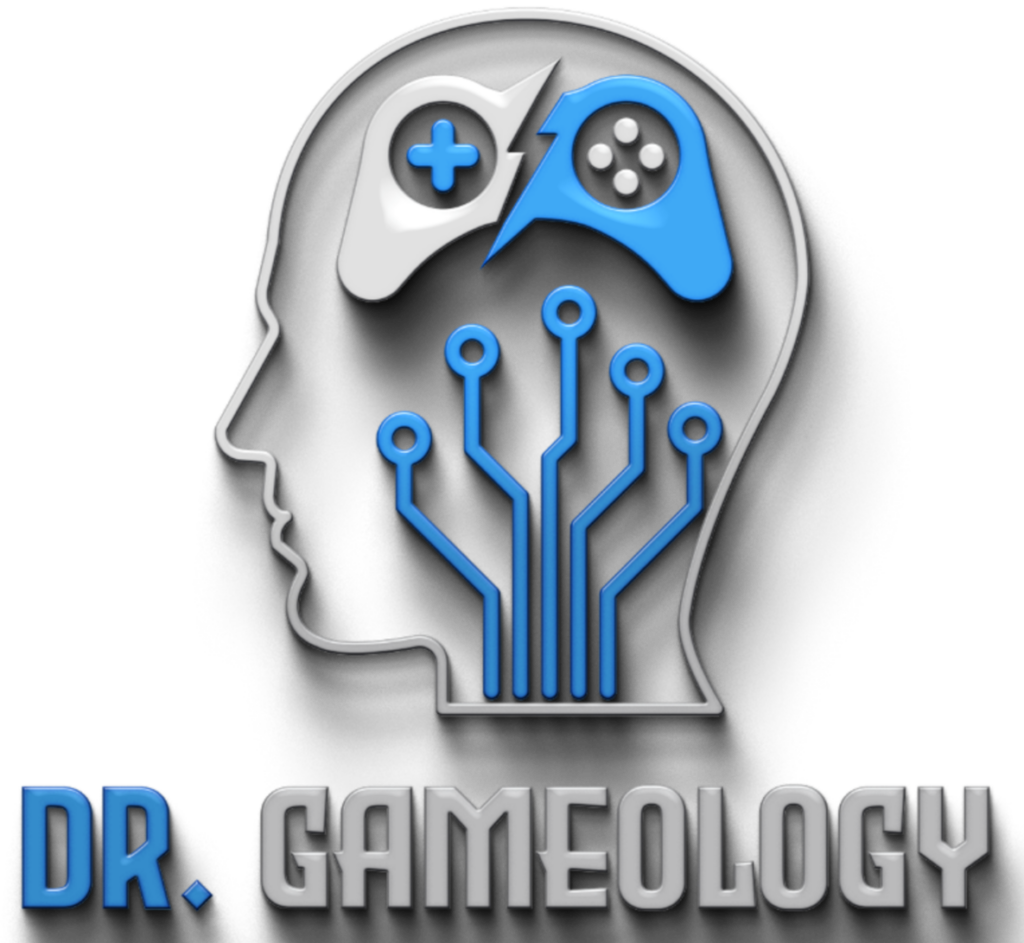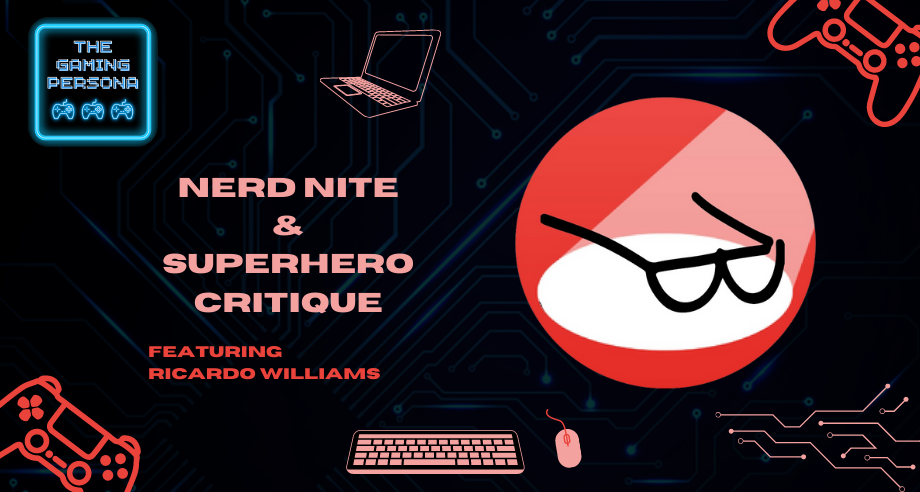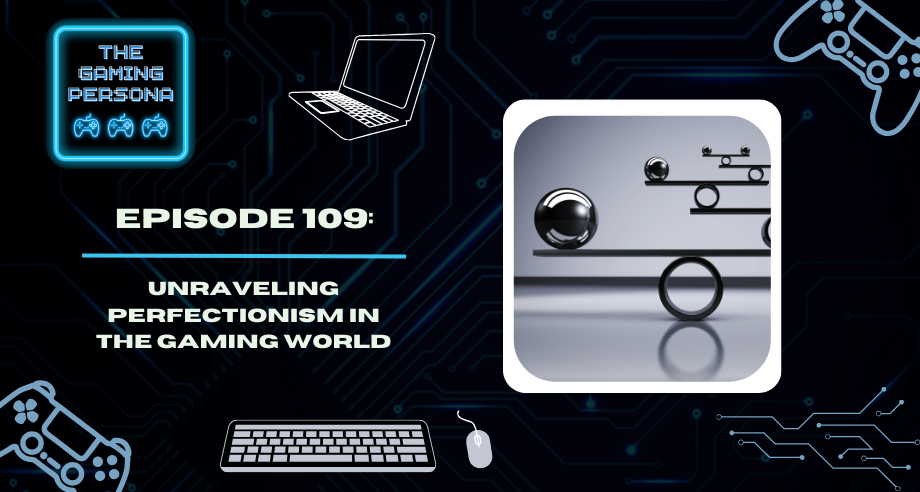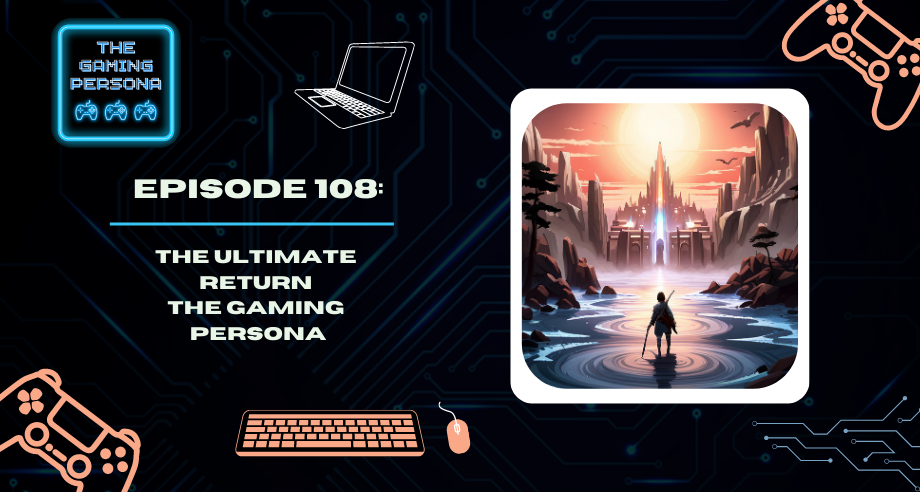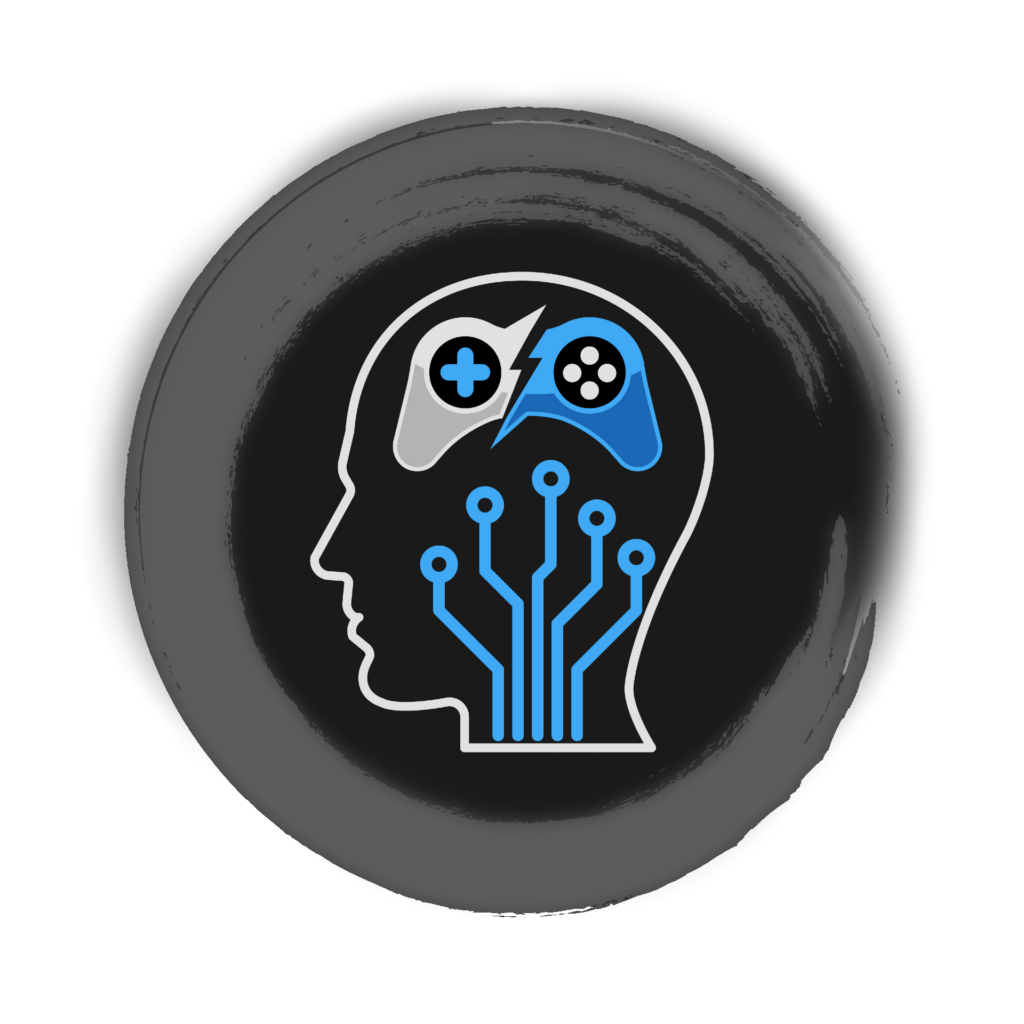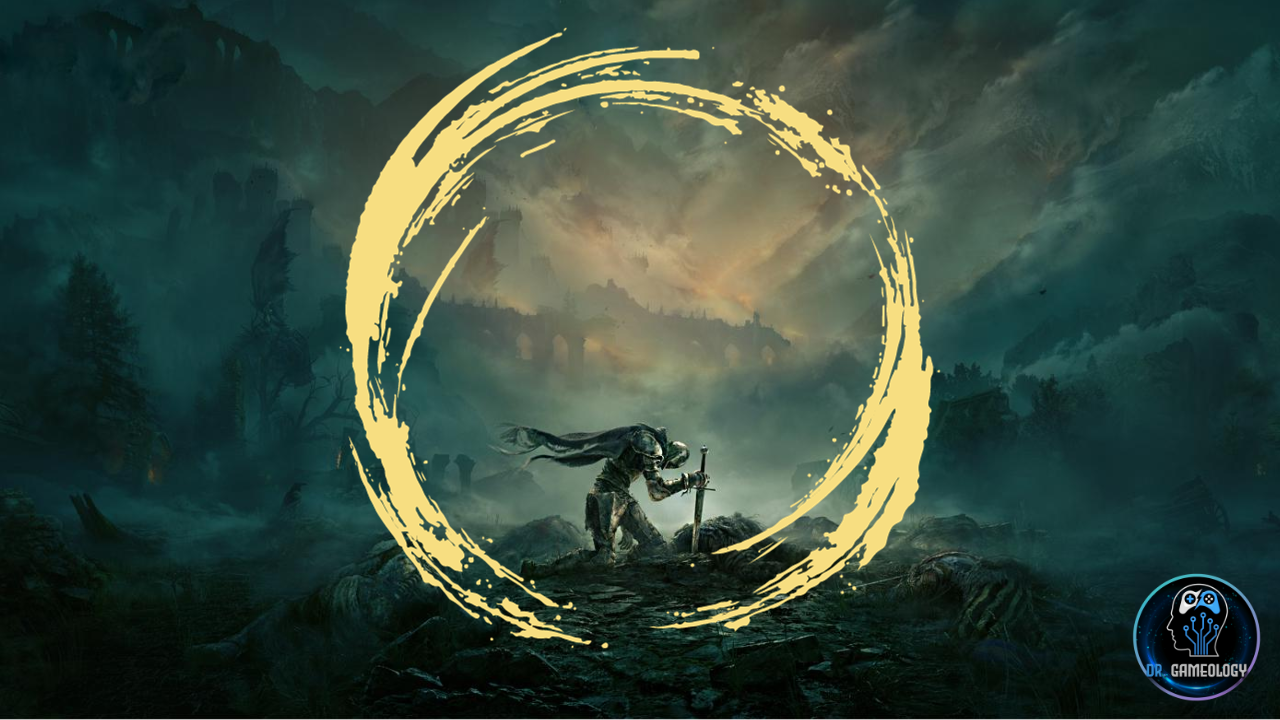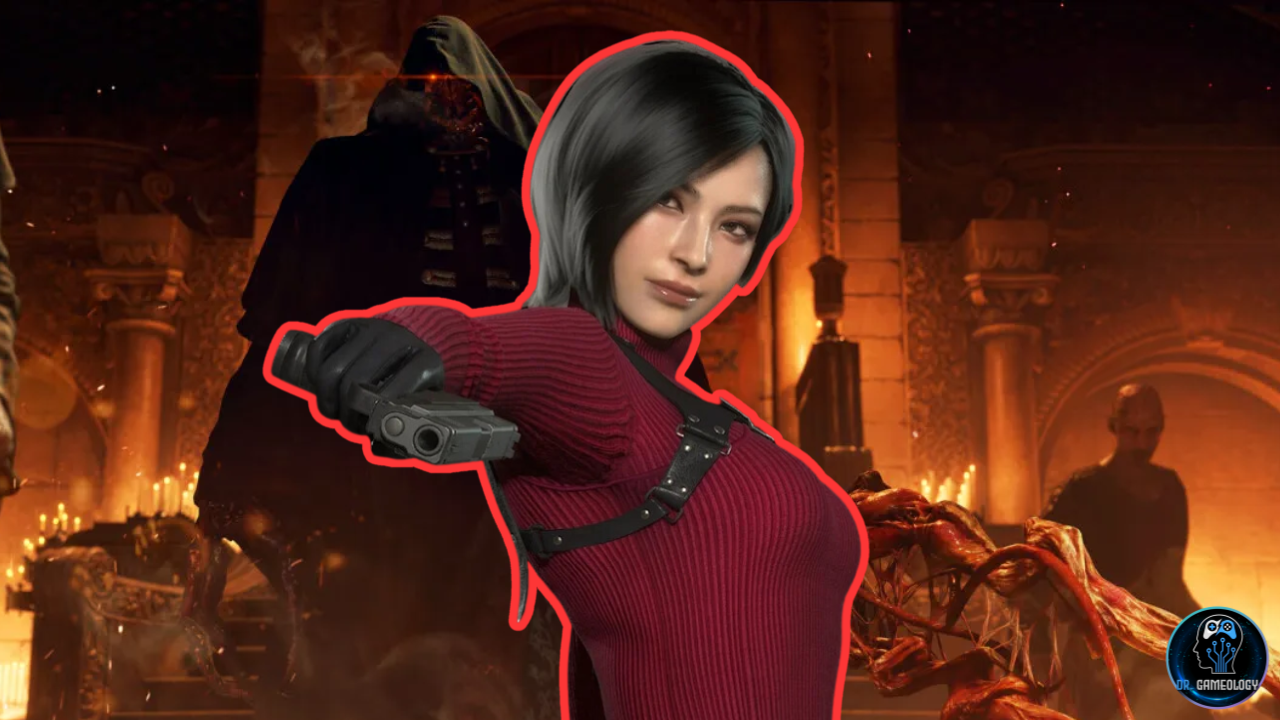Nerd Nite and Superhero Critique (feat. Ricardo Williams)
Come join us on The Gaming Persona podcast as we interview Ricardo Williams, the leader of Orlando Nerd Nite. We’ll discuss what it takes to put on a show every month and get his take on some of the latest superhero movies. Ricardo will share his insider perspective on what goes into putting together an event like Nerd Nite, from organizing volunteers to coming up with the themes for the evening.
Plus, hear his opinion on some of the most talked about superhero movies to hit theaters recently – you may be surprised by what he has to say! Tune in now for this insightful and fun conversation about all things nerd culture!
Download & Listen to this episode of The Gaming Persona Here:
Gaming Library:
Like a Dragon Ishin, Yakuza, Mass Effect, Dragon Age, Persona 5 Royal, Final Fantasy XIV, Supernatural App, Star Wars: The Old Republic
Usually we start with the Ordinary World segment, but I’m going to call an audible and just introduce our guest.
Nerd Nite: Finding Our Allies
So we are at Finding Our Allies because it’s too dangerous to go alone. And our guest tonight is Ricardo Williams. He is the host of nerd night Orlando. He is an actor, designer, editor, filmmaker, musician, writer, and all in all magician of all things currently, he writes about culture history and you as politics. Oh my gosh, you write about politics. That’s so what’s the word polarizing? Okay, so, Ricardo, welcome to The Gaming Persona.
Thank you for having me, Doc, this is really nice to be here. I’m excited. And I just want to say one thing about that bio. That was not like a flex, but I have done each one of those roles this week. So yeah, it felt like wishful thinking, like I’m doing one of those. And then in a couple years, I’ll do all five. It’s like, yeah, it’s just a crazy life. You know?
Sounds like you’re an actual real-life Bard.
I mean, I’ll take it. Yeah.
You know what, I actually really appreciate the way you did your bio. And it could have looked many different ways. It could have been 12 sentences and given a full explanation of each of those roles, and I still would have figured out a way to get it into the show. But I can tell you’re not an academic because it wasn’t 12 sentences with three extra sentences for each of those roles. So I really liked that. You know what?
Yeah, keep it succinct.
I mean, I wouldn’t know anything about that.
Which is nothing wrong with that. There’s nothing wrong with that.
I worked hard for every one of those sentences Ricardo. So you know, the reason that I reached out and asked if you’d be interested in doing the show is actually because I was getting a presentation ready to talk about parasocial relationships, which, which is a sort of relationship that we build with fictional personalities, like people that we see on the television, so we don’t actually have a relationship with them. But when things happen to them, we have an emotional response to it because we feel an ownership with the idea. So think about the reactions we have with sporting events or people getting elected or not elected or, or characters in fiction dying in a book and movie and anime. They don’t actually know us back. It’s not a full social relationship. And I was just thinking, Yeah, you know, I saw you put something on Twitter at the same time that I was wrapping up this PowerPoint, I just had this thought like, I think it would be really cool if I had him come on my show and not be a parasocial relationship so much. And he can talk about nerd night, and then, you know, and then you respond to it. And you’re like, we could do five days from now. And I was like, Oh, my gosh, that’s crazy turnaround. Sure, let’s do it.
I’m definitely the kind of person that will quietly judge people, when they get sad about like, a celebrity, diners loving, I’m like, You didn’t know that guy, what was going on with you, but at the same time, if a celebrity that I likes is even hurt, I’m like, in tears, you know, just kind of like, you know, oh, my God, I hope he recovers from that heart attack, you know, or something. And it’s like, I don’t know him, you know, we, we have this like, really distant relationship where I’m just a fan of whatever they do you know what I mean? And it’s fascinating how that how that works, you know?
Yeah, I mean, the end of Revenge of the Sith still gets me because I just, I just want and it cannot end up in the suit so bad. And then he’s like, yeah, oh, and it’s like, no, well, he goes, but I go, No,
In the alternate timeline install was like, by the way, we’re also gonna start doing, you know, parallel universes and time travel and Star Wars in the middle of the saga 30 years from the original, you know, which they probably would never do that. But that would be pretty fascinating. If, if you were watching if you’re in the audience, and you’re like, “Oh, my God, he doesn’t get in the suit.” And then a whole different universe is born. And then we have new Star Wars movies that aren’t tied in or…
Didn’t Star Trek do that for us?
That’s pretty much for JJ did.
Yeah. I’m actually kind of glad he did. Because if he had tried to stay with the expanded universe novels, he would have pissed off people, more people because they don’t like you’re not doing it exactly the way it is in the novel. And you know, in those books, I read a couple of those when I was a kid, I wasn’t that into them. But I definitely, you know, read a couple I mean, I was a Star Wars, you know, geek, as you know, in the in the late 90s. So like, the excitement of the prequels coming, we’re just like, holy shit, they’re coming like, this is real. So like, being going into Star Trek. It’s like, assuming what Star Wars are now I’m confusing myself, and going into Star Trek, and then having those all those extra novels and stuff. It’s like, Did you if he had done that, and like, kept that same universe, then the same kind of vitriol that happened with the Star Wars prequels would have happened to him. And instead, it didn’t happen. He kind of like got the, you know, the Star Wars, The Star Trek movies from JJ were actually pretty well received, you know, and had he not done so? Well, with those he wouldn’t have been hired to do Star Wars, you know, four or five or whatever, many years later, you know?
Yeah.
That’s really interesting for an agent to basically screen that like, Yeah, I’m glad that he didn’t stick to the expanded universe novels for Star Wars.
Nerd Nite: The Ordinary World
Oh, man, I wonder how Twitch is receiving that? Do you still like Ricardo as our guest? It doesn’t matter what you think about Ricardo. Okay, so I’m going to segue back, get a little bit of The Ordinary World going, where we can share everyday life through our games. We’re doing this out of order, but it’s my show, so we’re going to just make it work. Gene, what have you been doing with the world of video games this week?
I started playing Like a Dragon Ishin, which is a spinoff of the Like a Dragon game series. If you don’t know anything about those…
I do not. Explain it.
Okay, so in America, they’re called the first six games of the series was called Yakuza.
Oh, I know Yakuza.
Yeah, but so in Japan, it’s always been Like a Dragon. So they went ahead localized it they change it to Yakuza.
So I love how we’re not intelligent enough to understand titles.
Yeah. So now they’re gone. They rebranded reverse rebranded back to Like a Dragon. Anyways, it’s a whole series of basically crime drama games. But with a huge dose of just life simulation. Like all of the Yakuza games, you could play hundreds of hours of just other games like you could do bowling, you could play darts at the bar, you could go to bars and drink and play pool, stuff like that. So it’s like there is a crime drama narrative. Because you’re a Yakuza member, but most of the game is actually doing all their jobs.
Wait. So when you say life simulator, are you saying that you have to take care of your character to that there’s like biological limits to them being alive.
No way like, so when you fight gangsters and stuff and you take damage your app, you can go to a restaurant and go have a meal. And that’s how you heal up.
I love how the most nearly mortal wounds in video games are solved by eating soup.
Yeah, and then there’s also relationship building in the game. It’s like, oh, yeah, you can call up a friend and go on a bowling date, and build your relationship points. And then your friends will help you out in battle, or give you items.
You know, video games that have conversation simulators are actually really valuable for my line of work. And I know that if you look at our audience, there’s a mix right down the center of mental health professionals who want to know more about games. And then game players that think psychology of gaming is fascinating. So you know, for the mental health types, especially if you’re a student, and you want to do this kind of thing in the future. If you play a Bioware game, like Mass Effect, or Dragon Age, or anything, where you have to get relationship points by responding to the characters in the game, Persona is a really good example of this, you get the music notes above your head, or there, they get them over their head, when you say something they like. That’s a really valuable skill, if you’re doing it without a guide to remember who a person is the little hints that they give you about what matters to them, and the ability to show empathy and reflect ideas back that are useful to them. And video games are a great place to practice that because there’s really no consequence other than your relationship with an unreal person is in the tank. So I just think it’s, it’s just one of those things where you don’t really think about what is the video game teaching you to do? I did not know, Yakuza had that in it. But I’m always fascinated at the opportunity to play a new game that does things like that.
Nerd Nite: The Call to Adventure
The idea of the show is, who do we become when we play games? And I am sure that what you do for the nerd night programming community in Orlando, you’ve seen a lot of people decide to spend their 15 minutes or one hour if they don’t know how a clock works, to talk about, about how video games work. So I’m ready, man. Yeah. How did you get started? Well, actually, our audience maybe doesn’t know what this is. Can you tell us? You know, the, the short form answer what is nerd night.
So Nerd Nite is essentially a regular event that happens, where the host brings together guest speakers. And those speakers make presentations. And they essentially nerd out about what they’re passionate about, right? I host an overnight in Orlando, you’ve been a guest, and you’ve been a wonderful guest twice. You’ve done some great presentations, of course, one on games, on RPGs. And that was really fun talk and was at 2018 I think that was five years ago.
It was actually 2015 Ricardo.
Watch the Youtube version of the original Dr. Kaufmann Nerd Nite Presentation on Gaming & Personality
Oh, God, never mind. Well, I’m three years off because of COVID. So I think we just had a little time jump. Yeah. But, but yeah, so we have those events and cities all around the world. So we have about I want to say about 80 or so octave nights that are recurring in cities like Seattle, and London and LA and New York, and of course, Orlando, where I am, and internationally, you know, you know, Tokyo and, and we got a couple of Down Under in Melbourne. And so, and I do a lot of the special stuff too, like I host nerd night at like, other events and like conventions. And actually, before COVID We were working on this thing, or I was working on this thing to do a sort of like smaller programming of nerd night at assisted living facilities. You know, essentially, they’re always looking for events and programming for their, for the seniors that live in those, you know, places. And I was like, Well, I got a bunch of ideas for some fun stuff we could do to really engage them. And then of course, COVID hit and it’s like, well, you can’t have a bunch of people, strangers showing up to immunocompromised senior citizens. So I’m just now starting to get that back rolling. But that was like, two or three years off of that, you know what I mean? So it’s, you know, hence the time jump in my memory. Yeah. But, but yeah, so I do a lot of the special programming and stuff. And, you know, we did a nerd night at South by Southwest with National Geographic, you know, that’s so cool. We do. Yeah, it’s really cool. You know, they they come in, and essentially, foot the bill for us to be awesome, you know, and I was lucky enough to host nerd night at Comic Con. We did it with NatGeo then and, you know, so it’s a fun event where, you know, you bring together interesting people and they get to learn things from other interesting people. And for me, the whole thing has always been about reminding folks that learning is fun. And we’ve been doing it in Orlando, coming up on 10 years in two weeks. 10-year anniversary is actually on Pi Day on March 14. So as you mentioned earlier,
That’s some long-term planning Ricardo.
Yeah, I was thinking about that when we when we first kicked off. Yeah. I, you know, like you said, as you can imagine, I’ve, I’ve known a lot of gamers, some of my best friends growing up were all gamers, some of them actually, you know, have developed their own games and work for, you know, EA and stuff like that. But myself, personally, I’ve never been, I just never really was that into it, you know, and I had like a phase where, like, in the 90s, were like, everybody had a Sega Genesis, everybody has Super Nintendo, everybody had a Gameboy I had all those things. But like, they didn’t really hold my attention for very long. And I was very quickly. I mean, I enjoy them. They were awesome. I mean, I, I actually, up until just a few years ago, I still had them in a storage, like literally the original Nintendo and all the game cartridges and all that stuff. And I think I think I just gave them to somebody or I can’t remember what happened. I was cleaning it out, you know, back, right,
So many of your bills could have been paid by turning that transaction.
Probably yeah. And I had the I actually even had the original, not the Super Nintendo with the Nintendo, you know, with the, with the flat longer the thinner cartridges from 1990. Actually, I think that’s, I got that for Christmas in 1990, when I was five years old, with the gun, too, with the, with the Oh, yeah, I had that in there too. And it just had never been touched in, like 25 years, or whatever it had been, but, but I just I don’t know, I just never really got the, you know, I just I got I got so into, like, you know, playing music and taking photographs and making movies and stuff. And that really took my attention, I just ran with that. And then, you know, playing sports and stuff. So that just and of course, that’s just time consuming. You got to train and workout all the time. You know, when I was on track, we did workout twice a day, you know, five days a week, and then you know, once on the weekends, so it was like 11 workouts a week, you know, so it’s just a lot. And it really doesn’t leave you mentioned earlier about time, like, oh, you know, gamers are, you know, squeezing in time when they’re bored or break taking breaks or whatever, but like, didn’t really have much break time I was, you know, the slots in my life were pretty full, you know, as a kid. And in a fun way. Like I enjoyed all the things that I did. So, you know,
I’ve started using an app where you program the different jobs that you have, and the jobs can have projects and the projects can be broken into tasks. And then you have to identify how big of a time commitment each of those tasks are. So essentially, instead of saying, you know, I work for my university eight hours a day, you can end the day realizing I did 14 and a half hours’ worth of creating stuff for my university role, because you can see all the 15- and 30-minute chunks, even if it doesn’t take you that much time to actually do it. It’s like estimation of like, “Why am I always so tired? Why am I always sitting in front of this monitor?” And so I was talking with my wife at lunch about this app and how it’s changed the way that I see what I do and it’s actually made me appreciate more, how much I complete that is work related every day. And also it’s helped me to understand like where the time is where a break here would actually be okay, because I’m going to work 11 or 12 hours today. Yeah, because it’s a heavy paper grading day or something like that. And if you work eight hours a day you can do 24, Wait no eight hours a day you can do thirty-two 15-minute things in one day.
What do you normally what do you do that takes 15 minutes?
Checking email, answer student questions…
like stuff with your job I think you mean like other stuff.
Oh, in Final Fantasy 14 You can run one dungeon with the duty finder you know the group finder that pairs you with the random people.
I struggled to find something even in this moment thinking of something that only takes 15 minutes even the things that I like enjoy doing I would feel so caged if I had to have a time constraint of only 15 minutes of it you know like if somebody said okay, what are they so grab some food real quick and 15 minutes and like I would panic and have like a panic attack.
You don’t just limit it to the to the 15 minutes you put them together or two of those is 30 minutes. So it’s like now I can do a VR workout. Like I see we just put on the headset beyond the top of mountains and you know either swinging bats or punching moving targets for 30 minutes with music, or …
Punching moving targets. I haven’t done that in a minute. Well, you mean like in the game?
Yeah, no, it’s a game. But it’s got like an exercise trainer, they’re telling you what to think about telling you how the how the rhythm of the punches is lining up with the music.
I outed myself and not knowing how to play a video game.
Oh, that’s okay. It’s like punching people, but they’re not real people. They’re their targets that are coming at you very fast. Yeah, so you can basically what I’m saying is when people have stressed or they’re concerned that their day is not as complete as they wanted it to, a lot of times my job in a counseling session is, even if the thing they’re worried about is true, my job is to help them find a way to think about it that undoes that truth and makes them believe in themselves again, so that so that the thing that they wish was true becomes reality. So even if you can’t fit in something that you would be passionate about, you can, you just have to be more confident with the things that are already on your plate so that you end it with just a little bit more energy to get started with one extra thing that you elected to do. You know, like an elective in a college program is a class you don’t need to take but you need to take a class. Right? So yeah, you know, if you start thinking about things that I put into my day that are elective, I don’t need them. But I need to do something with that time. Yeah. And, and I feel like reading a chapter in a book versus sitting on your couch and scrolling is the exact same expense of energy. It’s just one of them. We end it feeling like yeah, I read chapter I accomplished something. The other one is like, wow, we’re about to be bombed in the world is doomed.
You know, it’s I’m so glad that you made that comparison, because that’s how I’ve been feeling about, like, watching a show, as opposed to going to the theater and watching a movie. And I love films, like I love watch movies. And people know that about me. Yeah, I’ll be with a friend. They’re like, Hey, did you watch that new show? And I’m like, “No, I haven’t seen it.” And they’re like, “Well, you have to see it. Everybody’s watching.” I’m like, to be honest with you, I’ll probably never watch it. And they’re like, “Why? Why would you watch it, it’s so great, you know what he’s talking about.” And in my, in my mind, I the idea of sitting down, like on a couch and watching a show that could presumably go on for eight or nine hours, if you add up the season, and then have seven or eight seasons and then not have an ending. Before you know like so years go by, in my mind, it feels like I haven’t really accomplished anything fulfilling emotionally from this piece of art. But if I go into the theater, which is an experience, because you’re traveling somewhere, and I see a movie, even if movies not that great. And I see and I walk out two hours later, I feel fulfilled because there’s a complete story. That story has been distilled into two hours. And it’s really not that much time. You know, two hours goes by pretty fast.
I agree with you about the cinema it the way you described it. I don’t know if you pick up on this if you have any kind of meditation or mindfulness routine. But movies actually encouraged us to do a lot of things that are on the mindfulness side of experience in life. Because it is discouraged to get distracted. And you have to practice being in the moment using some of that focus on the here. And now that Master Yoda is talking about some times in Empire Strikes Back.
I mean, I never thought of it. I never made that comparison. I mean, I do practice a little meditation, I don’t do it as often as I’d like to do it. But I never, you know, you’re the first person ever make that comparison. So when we say all the time, I mean, it’s to the point where like, I need to, like shut up about it sometimes, you know, but I’ve never made that comparison, I do feel a sense of like, like Zen the moment I walk in, like, in my mind, I think I’m just so used to it being like a, almost like going through like a portal. So like, you kind of psych yourself up like, Okay, I’m about to go through the portal, or I’m about to do it, I’m about to jump through the jump into the pool, or whatever it is. And then I’m there, you know, and every time I’m in the space, and someone like, takes me out of the of the of the narrative, like, I really, really hate when people walk in late and make noise. I hate that. I mean, because you already have like 30 minutes where you can like, kind of stroll into the credit other previews and stuff, you know, so somebody walks in, like 15 minutes into the actual movie. And they’re like, looking at their phones with the light looking for their seat, you know, talking to they’re like, is that the seat? Is that the seat? I can’t see it. And I’m just like, oh my god, shut up. You’re like ruining this. It’s like somebody’s talking to a meditation. Like, you just say, you know, like, we’re trying to, like, you know, reach enlightenment. And you’re over here like checking your phone or something or when your flashlight honor, you know, it’s Yeah. And to comment on what I said earlier, I do see a lot of bad movies. I only I don’t just only see movies that I’m like, tailor made for, like, I’m so wired into loving the experience, that even if I know movies, not going to be my my cup of tea. I’m still excited to see it. You know, like I see movies as varied as like, at for Brady, you know, or Ant Man, I’ll be seeing creed three this weekend, all very different movies. And yet, I still have a very good experience despite, you know, liking one over the other. You know,
Is that because of the editor or writer kind of roles that you have to fill or is it something else?
I mean, I definitely look at it. Like, it’s a bit of education too. Yeah. I mean, I, I can’t help but look at a movie and think about every department. You know, like I was looking at Ant Man and I kept thinking like, why did they like the scene this way? Like, and I’m just like, Oh, God, they probably liked it better. But then the guys and post changed it because that’s what Marvel wants or something. You know, like, you know, it’s hard to dissect movies like that, because there’s so many moving parts. And there’s so many things they change afterwards, you know, and there’s this old expression I forgot who said it that was like, you know, the movie doesn’t happen on set. The movie happens in the editing room. Yeah, you know, it doesn’t really matter. Yeah, yeah, everything is everything is posted and, and you know, I’ll watch a movie where like, I know they’re better than this. Why? Why is it so bad? You No, like, it’s like all these great writers and actors, and then it’s like, and then you watch the movie and it’s like, oh, wait, you know, the studio could have came in and just said, we want it this way, or we want to reshoot or we didn’t like this or, you know, it’s just a lot of other moving parts. So yeah, so when I, I was watching it, man, and I had this feeling like, they were kind of off to a good start with the humor. And it’s like the one movie in the Marvel Universe in my opinion, that should be funny. The idea of like the sky like tricking to an end it just the concept is so hilarious to me. It’s so ridiculous that it would even be like threatening to a villain, you know, that like little ant is going to be threatening to you. And yet they make such the first two enemies I think are fantastic. Those are actually my favorite of the Marvel movies. Actually, don’t you don’t like the Marvel movies that much. And I’ve done a lot of Nerd Nites and talks criticizing them.
They are the death of cinema.
I mean, I mean, I, you know, I kind of was, uh, I was having the Martin Scorsese feelings before he made the comment. Yeah, so, like, he’s pretty much saying what we’re all thinking, you know. But I like Ant Man and Wasp a lot. That was like, the second one. When they finally team up, she gets her suit. Like the tone was right. The pacing was right. I mean, Paul Rudd is like, it’s just like the most charming lead you can have in a comedy. He’s, he’s got all the acting chops, but then he just like, he has such a great rhythm in those scenes. And he knows how to, like play off the other actors and it just like, he’s actually in my opinion, like a great movie star. I don’t think he really gets credit for that. But, but I watched this new movie and I kept thinking like, the, I don’t know, just they I, they tried to make it more like an Avengers movie. And for me, that’s the failure. Yeah, this movie, they shouldn’t be funny. Like, it should be terrified that the world might and your heroes might die. And like to have like, someone making a joke every two minutes, when like, you could literally be at your deathbed or, you know, trapped in the quantum realm.
Yeah, I thought they took Ant Man and put them in the wrong movie, essentially.
I really missed Michael Pena. I don’t remember his character name, but from the first tumor, yes. Where he’s Yeah, yes. And he always had the montage where he’s like, let me tell you how this happened. And then he just told it in such a way that boiled down the plot, literally, but made you realize all in one moment how ridiculous this entire escapade is. And that was perfect for Ant Man.
Dude, it was so good man. Like, you’re obviously right. That was a missed opportunity. No, Michael Pena. They also didn’t have what’s the other one they didn’t have? They didn’t have his whole team.
Every everybody that’s not a superhero. And like, if you’ve never been in the quantum realm, you didn’t get to be in quantum mania.
I was disappointed by it. But I mean, I still enjoyed it because I like I said, I like movies. And, you know, you just you can’t not love Paul Rudd. He’s so good. Yeah, on screen. It’s like he was like, made to be this role. But I kept thinking we were like, the movie felt like, they were trying really hard to let me let me paraphrase. This is how I feel. It should be one or the other. It should be like, it man should be taken out of his comfort zone, and in the quantum realm, and be like, like, things are real. I have to step up and be the hero that everybody says that I am in the book, right? They wrote the book about and you know, he saved the role of Avengers endgame. Or it’s like, everything’s a joke. Kind of like Watchmen. You know, like the, the central thesis of Watchmen from the comedian’s character is that it’s all a joke. But it’s meant to be like social commentary and can’t man, it’s just kind of like, everything’s a joke, but it’s like butt jokes. Like, everything’s just dumb, you know? And it’s like, not the same type of like, fighting criticism about the scenario. Whereas, like, if they had a more like Watchmen, I mean, obviously the watchmen is like, totally different, but like, the kind of direction where like that tone works like, a lot of Watchmen is funny, but it’s also terrifying and it’s also exciting and thrilling and tension. There’s no real tension in a movie like quantum mania. There’s everything is just a joke. I never felt like they were threatened at all. I always felt like even with as good as Jonathan majors was as a villain. His character didn’t feel like it fit in at all. Like I didn’t even feel like when they were in the cells in the in the when he kidnapped the daughter and Ant Man, or Cassie and Paul Rudd. I never really thought that they were in trouble. Making sure he’s like I was in jail before to me too, and it didn’t feel like they were actually scared of Jonathan majors. They should have been terrified of him.
Yeah, it’s like Thor Ragnarök, when he got sent away to that planet, you didn’t know, you knew he wasn’t in trouble. He is Thor.
You know, in Ragnarök, they stick to it, you know, it worked. I mean, I didn’t feel threatened by anything. And it was like all a joke, but it kind of worked. But with this one, it just, it just, you know. And there’s also like, when you’re making a film, at the end of the day, its art, you know, like, and there’s so many moving parts, so many departments. You know, at the end of the day, who knows how an audience will react and, you know, in comedy is like, way harder than drama, in my opinion. So it’s like, the very function of a joke is to make someone laugh. If the person didn’t laugh, is it even a joke anymore?
I think about this a lot, dude. I mean, I’m like, That’s how hard comedy is like, you can make a drama and not make an audience cry, or sad, and it’s still a drama. But if you make a comedy, they have to laugh. That’s the function of comedy.
I don’t know, I really don’t know the endpoint of what I’m going for here. But I’m just going to share it because I’m really interested now to hear what you think about this. So if that kind of storytelling is not your cup of tea, how did you feel about the Batman?
Oh, good question. The bad man was fine. I didn’t particularly like, I didn’t walk away thinking I loved or anything like that. But it definitely was a very fine production. Like it’s, it’s again, it’s also kind of difficult to like, even I don’t want to say critique, but like, I’ve gotten to a point where like, so many of those types of films like not even super a film just like big spectacle films. There’s a certain playbook that’s out there, right. And when you’re making a movie, you can have all the different directors you want with a whole quote unquote, different vision. But the reality is like, there’s only so many different plot lines, right? There are only so many different movie studios. And you can be at writer, director, pitch an idea and studio likes it. But like, you’re still going through the same source material. You’re still like, you’re still the guy that grew up reading the same comments as the other guy. He’s still the guy that grew up watching Star Wars, almost every big director nowadays. What did they say was the movie that changed our lives?
Star Wars 1977
Christopher Nolan, Zack Snyder, you know, even James Cameron was saying that, and he’s a he’s a bit older, I think than those guys. But they all look at Star Wars as a touch point, you know, and it was I mean, it revolutionized cinema. So you have guys that are either influenced by Star Wars, or literally trying to make star well,
It created ILM. And it created Skywalker Sound like yeah, these are things that basically every movie that you see, used something that exists because of Star Wars and has a credited in there and credits.
Yeah. So I mean, he’s movies they like they look different on their face. But when you kind of kind of peel back the layers, there’s so many similarities. So I say all that to say that like the Batman was a pretty good film. I mean, I like Matt Reeves a lot. I like his non superhero stuff. I like the Apes movies. Those are those are fantastic. And he seems to have something really urgent to say with the Apes movies. But I mean, those movies come from like a history of you know, social commentary and obviously, you know,
“Urgent movies,” but we got to wait 4 hours for him to say something in Batman.
And that’s another thing of Batman. I felt like it didn’t feel urgent. It didn’t even move urgently like every scene is so drawn out. And so long, and I don’t know I mean, I get the intent of why they did that but I didn’t feel like for me personally it didn’t they didn’t stick the landing I mean, the whole point is to to build tension right like yeah, first thing first see him when he slowly comes out to the to the guys to terrify them. And that’s straight out of the complex you know, like the whole that’s that’s what Batman does. Yeah, but at the same time, it’s like, you don’t necessarily have to do that it doesn’t necessarily have to translate that way. I felt more tension in Michael Keaton’s first Batman and that those scenes quick you know, they move you know, like, the plot moves forward rather than
Your age was in single digits back then though Ricardo.
Jack Nicholson. All right. Is a force of villainy.
He’s incredible. I love that movie that I actually recently rewatched that that first Batman movie, and it holds up do they hold up so well, it just has so much good tension, incredible actors, I mean, all across the board like, yeah, supporting guys. And I love the little, small day players in that movie, like the play like the politicians and the cops. Those guys are also good and like, and timber and just totally nails production design of like a movie that would have come out in the 40s and 50s. You know, like the kind of Gothic look of the city using the matte paintings. I mean, there’s, there’s, there’s some on location stuff, but it’s mostly sets and paintings and, and it’s just beautiful and Gothic. And, and Michael Keaton is like he’s a bizarre guy. Like, he just sees an unusual looking person. And he portrays a character is like, oh, there’s something wrong with this guy. And you think, Oh, just because he’s a billionaire. Maybe he’s isolated from the world. But it’s like, no, he’s, this is what he does in his free time. That’s why he’s so fucked up. You know, and I love it.
And there’s a PTSD response to your parents being murdered in front of you and struggling with the fact that you can’t control everyone’s safety and existence.
They didn’t I mean, had you gone to therapy, you would have told him that. And he could have dealt with this a lot easier than didn’t, you know, beating up you know, poor people.
It’s a millionaire issue to like when you can do anything that you want. Because, you know, money exists to control what people like you and me and Gene do. When you have the cheat code, and that number becomes a sideways eight. And everybody, then it’s like, oh, well, please can’t do this. I’ll just dress up like a bat. Learn every martial art become the best detective in the world by doing all the puzzle books and acrobatics, you know, I’ll basically make it so I could win every gold medal if I wanted to. And then I’ll take on Gotham because I’ll be about like, 24 and I’ll still have unlimited money.
Yeah, you know, that’s the Batman character is becoming like, almost kind of like a modern Hamlet. Or like, ooh, every actor who like you know, loves comics, but also like respects the profession wants a go at it. You know what I mean? Like, they actually test a lot, and nobody really talks about it. But a lot of actors secretly like pull for that, for that role. They they pulled for when Ben Affleck became the character, you know, in the Snyder movies, they pull for when Pattinson became the Batman. It’s a really interesting character to to take on. I mean, like, like, all the things you just mentioned, he’s a, he’s got a lot of issues. And it’s, it’s a fascinating challenge to like, try something new with it, you know, but unlike Hamlet, you’re there’s no like, proper text that everybody has to play with. It’s like, because there’s so many options on what to do with him. You kind of get distracted in the spectacle, in my opinion. And you don’t focus on the text, you know?
Yeah. Ricardo, you actually stumbled onto something that I do that is so gaming persona, I told you, this is going to happen before the show, when you say, you know, I don’t play video games, I was like, you just watch what’s going to happen. So you know, I’ve done some presentations for a company called Geek therapeutics, and they are the company that created the certified geek therapy credential that counselors can add on and use. And what that is, basically is we know our theories, we know the basic classroom stuff, but we’re going to add an entire layer like in play therapy, you had the ability to interpret the play with toys, objects and imagination into the therapy. Geek therapy is like that, but it’s with Geek and fandom properties. And Batman is a really big one because the villains are straight out of the Diagnostic Manual of Mental Disorders, the DSM five, right. And that’s why by the way, the Joker always gets people in Oscar, you know, like to. Yeah, two of the four actors that have played him have won an Oscar for that role. Jared Leto had no chance. Jack Nicholson should have one. And then we have oh, yeah, Heath Ledger and Joaquin Phoenix. Yeah. So but that’s an exercise in practicing chaotic evil with complete psychopath II. And, you know, all the restrictions of society that influence the super ego to have a concept of morality. You know, whether you’re doing the origin story of the Joker, or he already is fully that way. You get you get to see, like, the actor can do anything and because of that, if you’re really talented and you say do anything that expresses this character, it’s magic on screen. But one of the things that I try to do in therapy is to use these fictional characters to help my client connect an idea of themselves with it. Question, you know, what would Batman do? You know, just kind of, you know, you’re empowered to do something about this. You don’t have to be a victim anymore. What would you do that you think would work and think outside of the box that way? And then you really, really back into reality. And you know, vigilantism is probably a good way for you to end up in jail because you can’t just be Batman. So yeah. So then then you take the metaphor out of
His biggest problem in my in my opinion is Alfred. Alfred enables him from day one. Remember to Alfred is the is the is the father figure,
Ricardo, the actor, designer, therapist in the making?
I’ve dated enough therapists and know all the all the stuff. They always talk about their work. They don’t name their patients, obviously. But they love to talk about the work.
Yeah, we do. I’ve never dated one of us, but I can imagine that.
You guys love to talk about it, which is a good thing. I’ve learned a lot, you know, in my adult years. And it wasn’t something I studied in school. So I mean, my entire knowledge of that whole field is from the people that I’ve been with. And but yeah, you know, Alfred enables him dude, even before think about this, even before his parents are good. Who’s his caretaker? Who’s he’s spending all his time with? So obviously, you know, he leans even further into alpha when his parents die. And like from day one, he’s like, Alfred, he told Alfred, everything’s like, Hey, I’m going to do this. I’m going to do this. I’m going to do this.
Alfred probably makes $700,000 a year taking care of Bruce and he’s like, I can have morals and good boundaries. Or I can just say “good job, Mr. Wayne. Where would you like your cup of tea? Mr. Wayne? Batman. Wonderful. Gotham needs that Mr. Wayne.” He just doesn’t want to be unemployed like he has. He has a $90,000 a year skill set. And he’s making like eight times that appeasing this millionaire with no maturity.
I mean, do you think do you think that he really makes him work after Sir but I mean, he’s pretty old. Because I feel like, I think at this at a certain point, I think Alfred is like, he just has all the money. And he’s kind of like the, you know, yeah, the, the, the, what do you call it the person that runs the estate, you know, that the person I’m just saying,
Look at the money and think about what you’re really feeling sorry for who’s in the wrong here. Like, Alfred knew what game he was playing at. Anyway, that’s what we call grooming, by the way, everyone, it’s a very bad thing. In different abuse cases, that’s a very important word Alfred had.
Put him put Bruce through some type of like, you know, therapy program or something or suggested or just gave him better advice. You know, he kind of push them in different directions, you know, when he was younger, you know,
That is how you know, it’s like a 1940s time period where the story originates from because, you know, Bruce Wayne is a male. His parents were gunned down in front of him doesn’t need therapy. Nah, he’ll be alright. He has tons of money.
I also find it ludicrous. He has the Wayne family has no other family like whereas Yeah. Where’s his family?
Yeah. I mean, maybe he didn’t want to paint the family like other all the rest of them are poor. So they’re like, no other poor family. We’re just going to hang out with rich families. Or maybe Alfred secretly his family, maybe like they hired one of his cousins to be his like Butler. Like, we’ll give our poor family a job or something.
You know, maybe, I don’t know.
That was the problem. I’ve always felt that way. Alfred has a problem. And if you think about the 1960s, Batman with the Adam West, as silly as that show was, there was one episode where they were like, onto him. I forgot exactly what the situation was. But I saw this when I was a kid, I’m gonna be six or seven years old. And they were honestly like, they they almost figured out that Bruce Wayne was Batman, in order to throw them off the set. They had Alfred be Batman for like a day or something. And like, he went out and did the whole Batman thing. And like, Bruce was like, hey, look, I’m over here. It’s not me, you know. So it’s kind of like He not only enables him, builds his stuff, fixes them, stitches him up, encourages him to do more. But then he also like is out there being Batman and covering for him every single chance he can get. I mean, that’s, I mean, I can’t imagine enable bad behavior than that.
I had no idea. This is where we’re, we were going but that’s pretty awesome. Like we’ve we’ve covered a compelling argument of why it’s okay for us psychologically to interact with Ant Man and Batman in the same way.
Have you started I got one Batman.
I just want to share the reason I asked about Batman is after I saw that movie, I was my mood was down for like 72 hours. I was not feeling good. I felt like the most negative pessimism that I’ve ever had in my life. Wow, that I just, I felt like Gotham City was so depressing. Yeah. And that’s what they’re going for. So bravo Mission Accomplished most like, I love Batman movies. I watch movies while I’m grading Ricardo almost every day. And as a result, I’ve seen the Dark Knight and The Dark Knight Rises, like hundreds of times, because what, grade five days a week for the entire year, 50 weeks a year. You know, and some movie is on my right monitor almost the whole time. And Batman was in my rotation. But that movie, I haven’t even seen it once other than being in theaters because I was like, I don’t need Batman to be that. Like, I really I really didn’t need and I thought Robert Pattinson did great. Like, that’s not the issue. The Riddler was great. I actually love what they did with that character. And, and still want also the penguin like, oh my gosh, Colin Farrell is like, yeah, that was a translation. That is amazing. So the elements of the movie I love but I can’t watch it.
I thought this movie was an opportunity to lean into that the concept that’s been discussed amongst Batman’s fans for years that Gotham is a prison of Bruce Wayne’s own design. Because, like, Yeah, I mean, in real life. If you’ve seen a corporation pump billions of dollars into a, into a town, things actually improve, like, like, you know, up here in Massachusetts, the city of Lowell was considered, you know, a pretty sloppy town. But then University of Massachusetts built a campus there, and everything dramatically got better. Like,
That was a Thomas Wayne character in Nolan’s Batman. That’s what he was trying to do. Right?
It’s really interesting to think about things like that. Also, video game wise. Wow, Ricardo, the last thing you said and Gene, the last thing you said have happened in video game form. So Gaming Persona, we’re going to do this. So in Arkham City, which is my favorite Batman video game, they wall off Gotham City from the rest of the world. And it becomes the place where the villains serve their prints, prison sentences. And New York. And yeah, you’re, you’re arrested too, as, or you’re, you are abducted as Bruce Wayne at the beginning of the movie, and wake up the penguins interrogating you, you of course beat him up, because you’re secretly Batman. And then Alfred uses a rocket to deliver a suit because he’s enabling you to be Batman. And then you play the whole game. So that’s how Batman gets into the city to figure out what’s going on. And it’s Ra’s al Ghul. It’s the Joker. It’s like high-level crime. It’s an amazing comic book story for Batman. But its sequel was not as good for me, because it made the Batmobile more important than Batman. And every time I started to feel like I got my flow being Batman. It’s like, here’s 45 minutes where you’re stuck being the Batmobile. And it’s like, I don’t want to play a Batmobile game. I don’t care. It’s not a character to me. I’m Batman. And as a result, it’s like no, you’re not really Batman if you’re not the Batmobile, and I was just like, “No, I can’t do it. This is not this is not why I turned my PlayStation on.”
I love Nolan’s Batman really dig into that in the dark night. Because you have the the Harvey Dent character who’s like, you know, the moral compass of this whole world until he becomes to face. And essentially he’s like, asking the important questions like, why are you working with crooked cops? Why are you working with the Batman? Why are you doing this, but then Harvey Dent himself, he kind of bends a line to the second he has a conversation with Batman, he becomes a part of that team. The second he goes on that roof, and Batman shows up and he talks to them and convinces him to bring Lau and back into Gotham, Parvati and immediately becomes complicit, you know, and he becomes a part of that. That’s the beginning of the downfall right there when three of them stay on that roof. And despite being the moral compass of the universe, which I love that no one’s Batman really kind of brings that that question, you know, and of course, you know, Gordon brings up the, you know, if I don’t work with the crooked cops I’m going to work with there’s nobody else left. You know, it’s either it’s either Batman or nothing, you know? So we got,
That is the flexible morality question is something where I wish there was a better answer. But unfortunately, the more things that I do, the more I come to realize that maybe that logic that Gordon shared in that quote, is actually very usable and necessary. And it sucks that it is. And so then it’s like, but by Me not pointing out how much it sucks. And, like, removing myself from the situation on principle, it makes it look like I’m endorsing it. And that, you know, it doesn’t matter what the situation is, in this example, it’s just true. Like, it’s very hard to stand on principle, when so many things require you to make compromises, you know, you were talking, I think it was preshow, Ricardo and I know, we’re probably running long on time, so we got to get to the end here. But you said something about having to pick and choose what fits in your schedule, because there’s important things to do. And then I of course, was thinking about, people need to work, people need to earn money, they need to pay their bills, keep their mortgage paid, not end up being homeless, like once you end up being homeless, the problems in life really escalate because now they’re taking out the bottom of Maslow’s hierarchy of needs, which is your safety, your security, your food and your ability to keep living. And, you know, if you’re dealing with problems above that depression, anxiety, stress, family issues, where you belong, who loves you, like those are the psychological needs that people come to therapy for. And that’s what I enjoy doing, you know, especially when we start going into the existential questions of what’s my purpose? And what makes me uniquely me, what are my strengths that I want to lean into to get to the places where I want to be in life my way and feel complete within myself that congruent feeling. But if you’re on that low level, it’s like, how do I not die this week? Yeah, yeah. And well, oh, man, I got completely off track. I started talking about my Maslow’s hierarchy of needs.
Sorry, I didn’t interrupt you that I kind of threw you off. Oh, yeah.
You’re okay. What were you going to say?
No, I was going to say that, like, I mean, just, I don’t know if you guys had seen this, but just to cap my feelings in the Batman thing. Because I know, we, we covered so much in a very short period of time, really. And, you know, I talked before about being a critic of Marvel movies and stuff, and, you know, just feeling kind of like, I would see them and to this day, I still see them and I feel kind of empty when I when I walk out of the theater, which again, doesn’t necessarily mean they’re bad. I just don’t feel a sense of fulfillment. And I had read this, and I even felt the same way with Matt reasons Batman, which is not a bad film by any means. But I read this quote from Alan Moore, the legendary Alan Moore. I love our and he had made this quote, I think it will, I’m trying to find it here actually. And because I don’t want to misquote him, it was yeah, it was last year. And he said, The urge, like, okay, hold on, let me let me get it right. I don’t want to say it wrong. He said, Oh, yeah,
Alan Moore will not love you. If you guys quote wrong.
But he said, the culture obsession with superheroes can very often be a precursor to fascism. That kind of info infantilization urges towards simpler times simpler realities. That can be a very often a precursor to fascism. And he was referring he made one comment to I’m trying to find the actual commentary made, but it was talking about people lining up to see Batman movies. And I was just like, oh my god, that I never really thought of it in that way before. I mean, he the comment is a lot longer than that. But that feeling of like, of nostalgia that you’re getting with a lot of these types Some movies. And it’s not, it wasn’t really the point when people like him, were creating that genre in the 80s. You know, like, really, we’re not creating it, but essentially fertilizing that genre, you know, and now everything is just dark for the sake of being dark. You know, like you said, like, you felt so bad after watching the Batman, like, so pessimistic. And he was like, that wasn’t the point of it. Like all these young filmmakers are kind of looking at it the wrong way. And they’re not necessarily deconstructing anything. They’re not really, there’s no urgency to say anything in these movies. They’re just like, I can make a beautiful image with a cool story. And, I mean, again, that’s fine. But like, what is the point? You know, what am I meant to feel? What are you trying to convey with your work? And what is the audience walk away from? And in your case, it was pessimism. In my case, I was like, I felt literally nothing.
It might have been depression. In my case, Ricardo, like, it literally affected my hope for my day for a few days. Like, I just wasn’t feeling like me. And, you know, I think that’s a really good point to lead off with. If so, for people listening to this episode, we’ve talked about two very popular superheroes from one from Marvel one from DC. And we’ve talked about the emotional impact of their most recent movie stories. If you’ve seen those movies, you can definitely make a connection with other people that have seen them. That’s how communities form. That’s why when people want to do topics at Nerd night, it’s a good idea to start with, what would I want to talk about with a franchise like Batman, because it’s relatable, and everyone has an idea about it. And then you put your own unique spin on it, talk about what Batman is for your area of expertise. And that’s compelling for 15 minutes of people’s time. And that’s really what geek therapy is, but that’s what fandom is, and that’s why these stories, whether we 100% Love them, or we have some critique, or it’s not critique anymore, and we’re just hating it for the sake of hating it. It still shows an investment in the story, you don’t hate things for no like that you have no interest in that vitriol comes from it became something I didn’t want it to. And I’m struggling with handling it a lot of times with our movies.
Nerd Nite: The Return
So I just want to ask one more question for you, Ricardo, while we wrap it up, I suppose this is The Return. Because we’re going to get back to our regularly scheduled life in just a minute. But are there any particular topics from Nerd nights that have really resonated with you over the years as an important set of ideas for the way you want to live life?
Well, the very first nerd Night event was March 14 2013, at the legendary startups, video and coffee. And a NASA scientist was there. He was a colleague of my former Co Co boss of nerd Knight, and he gave a talk about whether it’s possible to grow cannabis in space. Wow. And I remember thinking like, this, is it this this is nerd night, and it’s at its finest moment where someone, you know, well respected in his profession talking about if he could grow pot in space, you know, like, I just thought it was so fascinating. And the short answer was, yes, you can, you wouldn’t be able to, you know, I mean, it wouldn’t be simple, but it’s possible. And I just, I that stuck with me, you know, and obviously, still to this day, almost 10 years later. And that was really fascinating talk. And, and, but for me, it’s, it’s actually really more so about the experience of being there. I, one of the things I love to do is whenever I’m traveling, I’ll sit in at the nerd nights of the other cities, and I’ll just kind of just hang out in the back and not really talk to anybody and just kind of take it all in. And I love that like no matter what city I’m in, it’s all kind of the same. It’s different talks, different people, different bars, different, you know, sometimes club or a, you know, a theater venue or something. And yet, somehow the experience is all the same people are like, they just love being with other people and learning new stuff. And it’s, it’s fascinating, you know, even sometimes, like, I’ll think to myself, like it doesn’t even matter what the talks are. All that matters is that we’re here together, you know, and we’re at the end of at the end of the night, we’re going to walk away having learned something new, and so yeah, Yeah, that’s been my experience. If I wasn’t the host of nerd night, I would be there every month. You know, I would be, you know, maybe not in the front row, but I’d be in the back by the bar or something, you know, heckling somebody that was, you know, if they’re talking about Marvel or something, you know?
Yeah.
Yeah, that sounds also like, it would be peaceful for you, since you didn’t have to organize it and sending emails or create a presentation deck for your computer. Yeah. So
Max had a talk a couple years ago that I really, really, really, really liked. I think it might have been his first one, it was it was about the singularity. And for me, that’s always like, kind of like a science fiction thing. So you know, but he talked about it in a, in a more kind of real, tangible way, outside of, you know, the movies that I love. And I was just like, “Oh, my God, I’m terrified, like, ever, like walking up to him afterwards? Like, is that is it going to happen? You know, like, and, you know, I forgot what he said, but I just was like, you know, whatever you did up there on that stage at work, because you got me thinking, you know, like, you know, now all the everything’s firing off in my head, you know, like, you know, neurons are firing off and just like, Oh, my God, what’s going to happen? What’s going to be like, you know? And so, yeah, I mean, anytime you can, like, take a topic or idea, and really just kind of break it down. And, you know, just teach it to people, you know, or just be excited about it, you know, and that, to me is like a real kind of core aspect of, of a good nerd. And I talk and you’ve done that, you know, and you’ve been fantastic. Not once, but twice. And, and again, I mean, your first talk is about games. I’m not into games, but I loved your talk.
Yeah, that was the first presentation I did in public that took the idea of what if our personality type is being expressed in the way we play games. And I hadn’t done my research as a doc student yet. So once that TOC, and a few other things happened, I started to realize that I don’t have to really hesitate on this anymore. I just need to be excited to share it with a new group of people. And I was actually really blown away with the response. Because some of the slides that I shared, you even commented that I had no problem, saying things that were a bit morbid, because you know, talking about characters that you’re going to harvest, like in Bioshock, you kill the will sisters with that moral decision. And then, you know, talking about how it’s not a big deal to watch Nathan Drake or Mario die painfully over and over. But if it’s your character, and it’s got your face on it, it might have more of a reaction.
I know who Nathan Drake is. That’s from Uncharted, right? Yes.
You probably saw that.
I know that because of the movie.
Yeah, that’s very good. Very good. Game series. First. Gene, do you have any takeaway thoughts from our chat tonight?
Ah, you know, I you know, I been to nerd night, but I, I believe the concept is, like, I believe I understand the concept. Like, if you get someone up on stage, to be able to talk passionately about anything like that really interest them. It’s worth watching, like, just being there. Like, so long as they really have that, that passion for it. It’s like, it’s like a time.
It we might argue that online, you know, because we’re so inundated with content on the internet, that when you travel to somewhere, and it becomes an experience that you do with other people in a public space, that 15 minutes or 20 minutes of the talk, you know, it’s awesome, you know, it’s great, you know?
Yes, and my next talk at Nerd night will be why the sequel trilogy is the best part of Star Wars.
Oh man, that’s going to get a raucous response.
That was sarcastic satire?
You should do it. You should do a talk about how there should be justice for the prequels. You know now that we’ve seen the sequel trilogy, the prequels don’t look so bad do that.
I loved the prequels my entire life. I actually let my hair grow longer so it would be closer to Hayden Christiansen when I got married. You know, so I was going for the Revenge of the Sith but before the lava burn, look, obviously.
I love Ewan McGregor as Obi Wan so I love it for those reasons.
I loved the Obi Wan show too. We haven’t even talked about that on this show.
If these conversations have sounded fun to you, and you’re looking for some great people to play online games with check out AIE at aie-guild.org.
And I have one last quest for everyone to collect for the day. Be a billionaire. Fight Crime, not really and Continue the Journey.
Continue the Journey

Be sure to check out more amazing episodes of The Gaming Persona!!

Important Links
- @DrGameology – Twitch
- Apple Podcasts – The Gaming Persona
- Spotify – The Gaming Persona
- Google – The Gaming Persona
- LinkedIn – Connect with Me
- Blogs – Dr. Gameology
About Our Guest
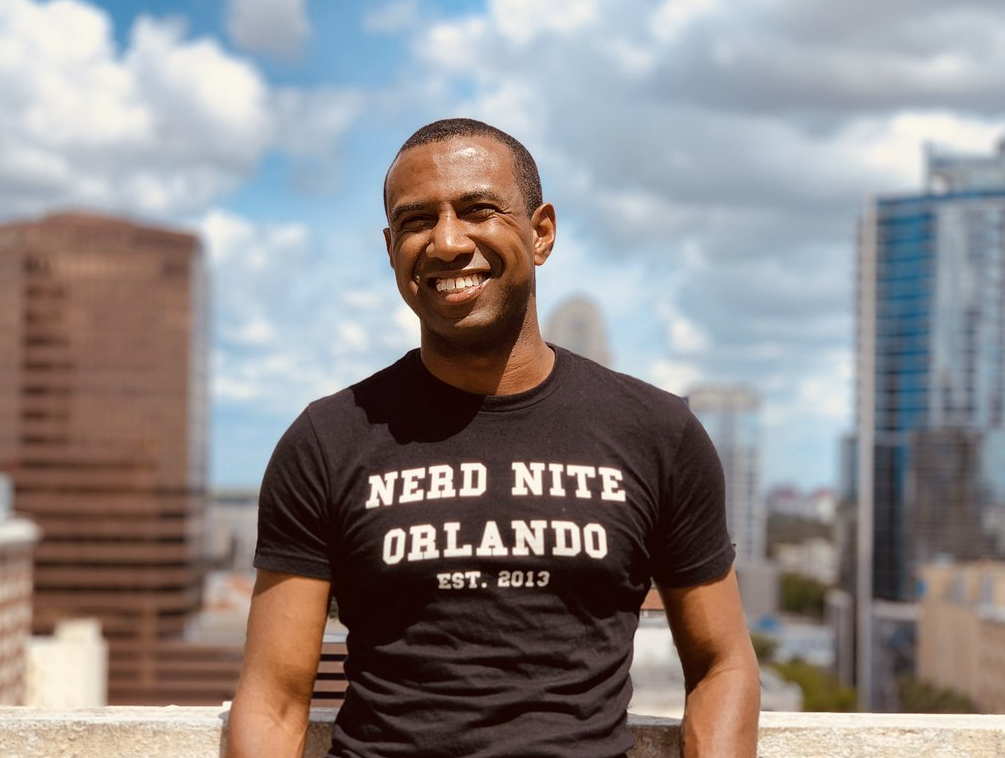 Ricardo Williams is the host of Nerd Nite Orlando. This event has brought together geek communities for short topics of our nerdy passions for the past 10 years.
Ricardo Williams is the host of Nerd Nite Orlando. This event has brought together geek communities for short topics of our nerdy passions for the past 10 years.
Ricardo is also an actor, designer, editor, filmmaker, musician, and writer. Currently, he writes about culture, history, and US politics.
